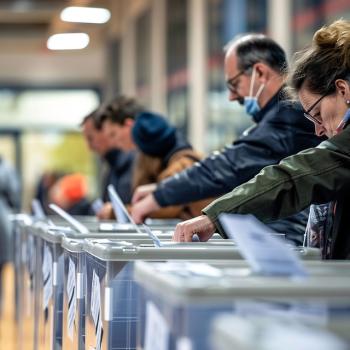Editors' Note: This article is part of the Patheos Public Square on the Future of Faith in America: New Religions. Read other perspectives here.
Of all the religions in America, the Unitarian Universalists ought to be the least anxious about the future. Ever since Boston Unitarian minister Theodore Parker delivered a sermon entitled "On the Transient and Permanent in Christianity" in 1841, Unitarians have been grounded in the fact that the forms of religion — the outward surfaces and even the particular formulation of basic beliefs — are of a specific time and place. They are transient, temporary, and changeable.
We can see the contours of the coming cultural era already: consumerism, weak institutional loyalties, enhanced and accelerated networking, multiplying "scenes," niches, and branded subcultures, fluidity and mobility, increasingly narrow generational cohorts.
Religion, and Unitarian Universalism, cannot reverse, resist, or slow these cultural changes. In one way or another, we will live in the world they will make. The question is, "Can we stay true to what is essential to us in the new cultural setting?"
We are invested in a specific understanding of our work which is not well suited for the coming era. During the recent era of conservative cultural ascendency, Unitarian Universalism settled on a small vision of its mission. We came to think that creating and sustaining inclusive worshipping congregations was the most we could do. Consequently, our vision values process over purpose; it values inclusion over evangelism.
We assumed that people would make long term, even lifetime, commitments to a specific congregation, a multi-generational community that would be safe and welcoming in all dimensions. That vision of a unique covenanted community is out of step with where the culture is going: fluid, mobile, age stratified, branded. We see that mismatch already: shorter-term and more shallow commitments, memberships that last through only one life stage, or are active only in one location.
The way UUs do religion does not now fit the times, and it is increasingly becoming more anachronistic. We are more committed to the way that we do church, which is the transient, than we are to the liberating spirit, which is the permanent heart of all liberal religion.
For Unitarian Universalists and other religious liberals, the work of the coming era is to communicate the spirit they serve and to embody it in new cultural contexts. It means working in much more short-lived and specific kinds of groups and bodies: youth organizations, justice movements, parenting groups, support groups, shared housing, intimacy circles, pop-up churches, everything from flash mobs to yes, even cathedrals. It means creating many kinds of public ceremonies and rituals to invoke and honor the liberating spirit.
For the liberating spirit is moving everywhere. It is more than the sum total of political campaigns and social movements. It is something "in the air," calling us into solidarity with others, giving us courage, giving us new eyes to see both what is wrong and what is possible. There is a growing sense that an immanent liberating spirit is the transcendent within us, an essential aspect of the human condition.
Unitarian Universalists are devotees of the liberating spirit. So are many other people in other religious traditions. People are loyal to spirits instead of traditions; that's what they are trying to say when they use that imprecise phrase, "spiritual but not religious."
What is that liberating spirit? We know it by what it calls out from us: it is that which calls us to honesty and humility; it is that which empowers us to be self-possessed and fearless; it sparks our feelings of solidarity; it generates generosity and gratitude; it inspires reverence and pulls us out toward openness and love.
The liberating spirit is at work in the universe; a transforming, creating, and sustaining power not made by human hands, much more than the sum total of all the works of all of our hands. It is the enduring that lies within the ever-changing. It is the holiest thing that we will know.
We will need to be nimble and creative to bear witness to the presence of that spirit and testify to its power to change both lives and the world.
8/26/2015 4:00:00 AM




